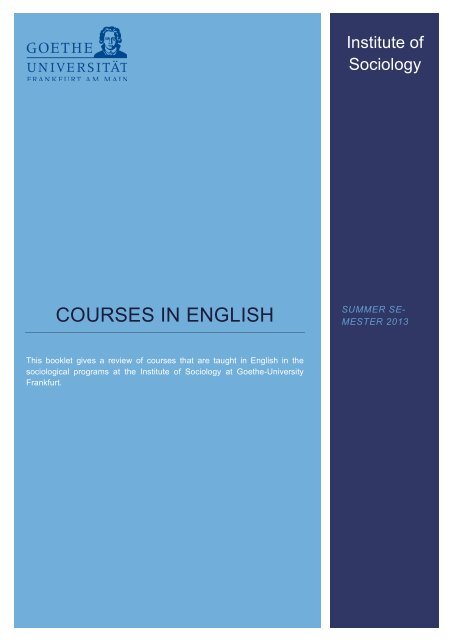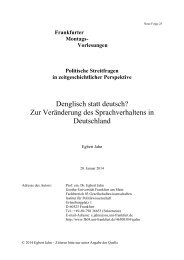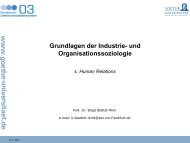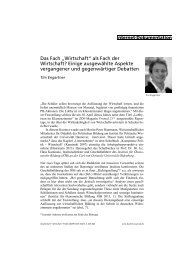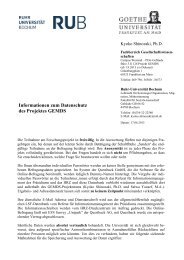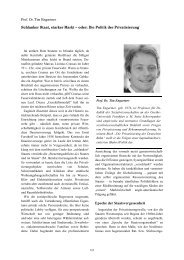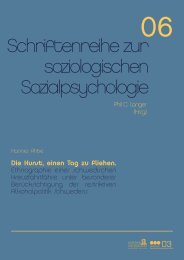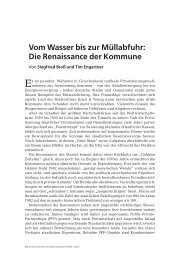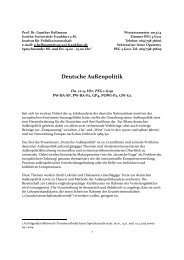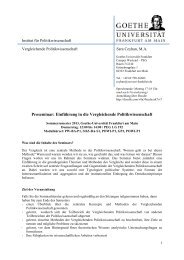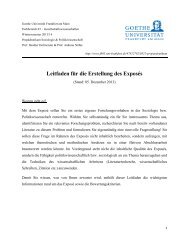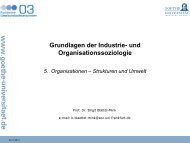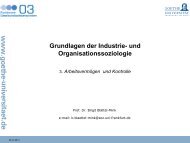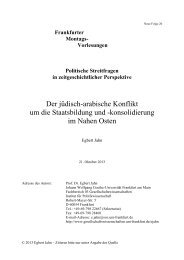Institute of Sociology GU Frankfurt International Courses
Institute of Sociology GU Frankfurt International Courses
Institute of Sociology GU Frankfurt International Courses
You also want an ePaper? Increase the reach of your titles
YUMPU automatically turns print PDFs into web optimized ePapers that Google loves.
0<br />
<strong>Institute</strong> <strong>of</strong><br />
<strong>Sociology</strong><br />
COURSES IN ENGLISH<br />
SUMMER SE-<br />
MESTER 2013<br />
This booklet gives a review <strong>of</strong> courses that are taught in English in the<br />
sociological programs at the <strong>Institute</strong> <strong>of</strong> <strong>Sociology</strong> at Goethe-University<br />
<strong>Frankfurt</strong>.
CONTENT<br />
1. Preliminary remarks ............................................................................................ 2<br />
1.1 Aim ....................................................................................................................... 2<br />
1.2 How to use this booklet ........................................................................................ 2<br />
1.3 Further Information .............................................................................................. 2<br />
2. Course descriptions ........................................................................................... 3<br />
3. Program Integration .......................................................................................... 12<br />
3.1 BA Program <strong>Sociology</strong> – Modules ..................................................................... 12<br />
3.2 MA Program <strong>Sociology</strong> – Modules .................................................................... 13<br />
4. Academic Staff .................................................................................................. 15
2<br />
<strong>Institute</strong> <strong>of</strong> <strong>Sociology</strong> – <strong>Courses</strong> in English – Summer Semester 2013<br />
1. Preliminary remarks<br />
1.1 Aim<br />
The institute <strong>of</strong> sociology at Goethe-University <strong>Frankfurt</strong> is aimed at strenghtening its international<br />
pr<strong>of</strong>ile in teaching and extending its English-taught courses in the BA and MA programs.<br />
The booklet gives a review <strong>of</strong> courses that are taught in English in these programs in<br />
the summer semester 2013.<br />
We hope that both international students as well as German students that like to enhance<br />
their skills in the contemporary language <strong>of</strong> the scientific community will find the booklet helpful<br />
for making their course choices. We look forward to a promising semester a our new<br />
home at the Campus Westend with you.<br />
1.2 How to use this booklet<br />
The booklet includes the core information about the courses that are taught in English in the<br />
BA and MA programs in sociology. It is advisable, hoewever, to check the details in the online<br />
university calender (LSF) since dates, times, and rooms might have been changed. The<br />
LSF is accessible at URL https://qis.server.uni-frankfurt.de.<br />
Please note:<br />
1.) While the majority <strong>of</strong> courses will take place at the PEG building at the Campus Westend<br />
<strong>of</strong> the university, some courses will be at the Campus Bockenheim.<br />
2.) At German universities courses usually begin 15 minutes later (c.t. = cum tempore) and<br />
end 15 minutes earlier than stated in the course description. For example, a course that<br />
is scheduled for 2-4 PM will probably start at 2.15 PM and end at 3.45 PM. There are<br />
exceptions <strong>of</strong> this custom <strong>of</strong> course, so ask your teacher or fellow students about about<br />
the time arrangements for a certain course, if you are not sure about it.<br />
1.3 Further Information<br />
§ Lecture period: 15 April – 19 July 2013.<br />
§<br />
§<br />
Website <strong>of</strong> the Faculty <strong>of</strong> Social Sciences: http://www.fb03.uni-frankfurt.de.<br />
<strong>International</strong> Office: PEG Builing, Campus Westend.
<strong>Institute</strong> <strong>of</strong> <strong>Sociology</strong> – <strong>Courses</strong> in English – Summer Semester 2013 3<br />
2. Course descriptions<br />
Can Feminism be Racist<br />
Helma Lutz & Kristina Nottbohm<br />
This seminar deals with the relationship between feminism and racism. Feminism, being one <strong>of</strong> the<br />
most progressive social movements <strong>of</strong> the 20th century has been accused <strong>of</strong> universalizing the social<br />
needs <strong>of</strong> middle class white women while neglecting the problems <strong>of</strong> Third World, Black and Migrant<br />
Women since the early 1960s. During the 1990s and by the beginning <strong>of</strong> the 21st century heated debates<br />
about class and ethnic differences and other social positionings among women as well as racism<br />
in feminism have been carried out in many countries, in particular in the English speaking<br />
world. Susan Okin’s seminal article “Is Multiculturalism bad for women?” triggered a broad range <strong>of</strong><br />
approving as well as furious reactions, some <strong>of</strong> which were published together with Okin’s essay in an<br />
edited volume: Susan Moller Okin (1999) “Is Multiculturalism bad for women?” Princeton University<br />
Press. In this seminar we will reread some <strong>of</strong> the classical texts, starting with the US civil right movement:<br />
The Manifest <strong>of</strong> the Combahee River Collective, Angela Davis’s ‘Women, Race and<br />
Class’(1981) and ‘Blues Legacies and Black Feminism’ (1999), proceeding to the British debate in<br />
Feminist Review in the early 1980s and 1990s debate about Okin’s essay and following the works <strong>of</strong><br />
recent scholars in the 21st century debate all over Europe (cases here are: Germany, France & Sweden).<br />
The seminar requires dedicated students willing to read and discuss in English. Two guest<br />
speakers from the University <strong>of</strong> Lund and Linköping, Sweden, Pr<strong>of</strong>. Diana Mullinari and Dr. Anders<br />
Neergaard will give a lecture about the concept <strong>of</strong> “caring racism”, a term they coined for racism<br />
found among female politicians in the Swedish Right Wing Party.<br />
Different dates and rooms, please check LSF for details.<br />
Master level: HS, HP; SOZ-MA-2, SOZ-MA-5; SOZ-MA-6, IS-MA-6<br />
Confucianism and Korea's Success<br />
n/a<br />
For course description please check LSF.<br />
Monday, 12-4 PM, PEG 1.G107<br />
Master level: SOZ-MA-1, SOZ-MA-4, SOZ-MA-5, SOZ-MA-6, PW-MA-4, PW-MA-7, IS-MA-2, IS-MA-<br />
7a<br />
Contemporary Challenges in the <strong>Sociology</strong> <strong>of</strong> Work<br />
Heather H<strong>of</strong>meister<br />
This masters-level seminar will look at the cutting-edge research in the <strong>Sociology</strong> <strong>of</strong> Work that has<br />
been published in German and English in since 2000. We will use scientific and lay-person periodicals<br />
to further illuminate issues and identify emerging fields in the sociology <strong>of</strong> work.<br />
Tuesday, 16-18 PM, PEG 1.G161<br />
Master level: SOZ-MA-4, SOZ-MA-6, HS
4<br />
<strong>Institute</strong> <strong>of</strong> <strong>Sociology</strong> – <strong>Courses</strong> in English – Summer Semester 2013<br />
Current debates and trends in sociology: discourse analysis <strong>of</strong> sociological<br />
journals, 2010-2013<br />
Phil C. Langer<br />
The seminar is aimed at critically analyzing dominant debates in current sociology. Based on a brief<br />
introduction into the methodological foundations and methodical approaches <strong>of</strong> discourse analysis, we<br />
will closely examine recent volumes <strong>of</strong> leading sociological journals in order to outline implicit power<br />
structures <strong>of</strong> knowledge production and claims <strong>of</strong> authority in the social sciences. As a special focus <strong>of</strong><br />
the seminar we will discuss issues <strong>of</strong> gender and the contribution <strong>of</strong> social psychological perspectives<br />
that are present/absent in the examined sociological debates.<br />
Tuesday, 8.30-10 AM, PEG 1.G107<br />
Master level: SOZ-BA-SP, SOZ-MA-2, SOZ-MA-3, SOZ-MA-6, HS, HSpsy<br />
Empirical Research Methods<br />
Claudius Wagemann<br />
This course complements the “Research Design” course, <strong>of</strong>fered in the winter term. While the winter<br />
course concentrates on more general questions <strong>of</strong> research designs, this summer course looks at the<br />
practicalities. This means that we will deal with concrete questions <strong>of</strong> data collection (and also, if necessary,<br />
<strong>of</strong> data analysis). The main focus will be – as in the winter term – on the empirical, qualitative<br />
and case-oriented research tradition, although students preferring other approaches will also benefit<br />
from the course. We will place an emphasis on (oral and written) interviews and various forms <strong>of</strong> text<br />
analysis. With regard to these techniques, there have been many advances in recent times so that a<br />
more intensive treatment <strong>of</strong> them is justified. Furthermore, participant observation, focus groups and<br />
other methods <strong>of</strong> data collection will be treated. We will also discuss how to triangulate various methods<br />
in a research project. It is planned to illustrate the topics with examples from the research reality.<br />
This course is thought to be fundamental for a successful reception <strong>of</strong> empirical research, both for<br />
political science and sociology M.A. students, but should also prepare for the M.A. theses. Furthermore,<br />
it introduces some topics <strong>of</strong> “methodology” as a social science sub-discipline and keeps the students<br />
up-to-date with current developments. It is especially recommended for those students who are<br />
at the beginning <strong>of</strong> their M.A. studies.<br />
Tuesday, 8.30-10 AM, PEG 3.129<br />
Master level: HM, SOZ-MA-1, PW-MA-2, IS-MA-1<br />
Engendering Migration<br />
Minna-Kristiina Ruokonen-Engler<br />
Until the 1990s, the gendered nature <strong>of</strong> inter- and transnational migration movements got hardly any<br />
attention in the field <strong>of</strong> mainstream migration research. The increasing worldwide feminization <strong>of</strong> migration<br />
however, forced to interrogate male biased notion <strong>of</strong> the migration subjects and to research not<br />
only female and male migrations, but also the gendered structures <strong>of</strong> migration regimes and movements<br />
as well as gender orders both in sending and receiving societies. In this seminar, we will explore<br />
different forms <strong>of</strong> gendered migrations at the intersections <strong>of</strong> nationality, ethnicity, race and class.<br />
In order to obtain more insights into gendered negotiations in the lives <strong>of</strong> migrant subjects, we will ask<br />
how migrations can both reinforce and challenge gender relations, patriarchal and heteronormative<br />
social orders and asymmetrical power structures.<br />
Friday, 10-12 AM, PEG 3.170<br />
Master level: Soz-MA-2, SOZ-MA-6
<strong>Institute</strong> <strong>of</strong> <strong>Sociology</strong> – <strong>Courses</strong> in English – Summer Semester 2013 5<br />
Ethnographic field notes<br />
Endre Danyi<br />
The aim <strong>of</strong> this course is to deepen students’ understanding <strong>of</strong> ethnography by providing an overview<br />
<strong>of</strong> various ethnographic research approaches in the social sciences and <strong>of</strong>fering a series <strong>of</strong> hands-on<br />
exercises in taking and using fieldnotes. The course will be organised around six specific themes (see<br />
below), and each theme will be explored in group discussions as well as through individual research<br />
assignments. Please note that the course will be held in English, so some experience with American<br />
or British academic writing is recommended.<br />
Course outline:<br />
1. Introduction<br />
2. What is an ethnographic field?<br />
3. Writing genres 1: headnotes, sketchnotes, fieldnotes<br />
4. Writing genres 2: discussions, interviews, transcripts<br />
5. Drawings, photos, and other audiovisual records<br />
6. Organising files and materials<br />
7. How to relate to theory?<br />
Wednesday, 18-20 PM, NM 112 (Campus Bockenheim!) (26.6.2013: 16-18 PM, PEG 3.129)<br />
Master level: GM 2; SOZ-MA-1; SOZ-MA-5<br />
Good Governance and Good Democracy<br />
Brigitte Geißel<br />
This course looks at different measurements evaluating the quality <strong>of</strong> democracy and the quality <strong>of</strong><br />
governance. The theoretical assumptions underlying the different measurements will be explored as<br />
well as the application <strong>of</strong> indicators and measurement. A basic knowledge <strong>of</strong> theories <strong>of</strong> democracy<br />
and <strong>of</strong> governance as well as <strong>of</strong> quantitative research methods are necessary to comprehend the<br />
course.<br />
Thursday, 10-12 AM, PEG 3.G170<br />
Bachelor level: SOZ-BA-SP, PW-BA-P1, PW-BA-SP, GP3, GP5, GW-G2, POWI-P1, POWI-S2<br />
Intro to the <strong>Sociology</strong> <strong>of</strong> Work<br />
Heather H<strong>of</strong>meister<br />
What is work? What is the sociology <strong>of</strong> work? What core research has influenced the field? How do<br />
race, ethnicity, class, gender, education, social and technological change, and social networks play a<br />
role in work and occupations? Special topics: History <strong>of</strong> Work, Paid and Unpaid work, Organization <strong>of</strong><br />
work through pr<strong>of</strong>essions, Work within Organizations, Inequalities at work, work and health, work and<br />
family.<br />
Tuesday, 2-4 PM, HZ 5<br />
Bachelor level: SOZ-BA-S3, POWI-W, GW-G2-S, HS
6<br />
<strong>Institute</strong> <strong>of</strong> <strong>Sociology</strong> – <strong>Courses</strong> in English – Summer Semester 2013<br />
In/Visible Racism<br />
Minna-Kristiina Ruokonen-Engler<br />
This seminar explores diverse visible and invisible forms <strong>of</strong> racism, racialisation and racially structured<br />
social realities. We will study classical and contemporary texts on racism and learn about different<br />
theoretical conceptualizations. The social construction and cultural production <strong>of</strong> race and racial discourses<br />
will be a further focus <strong>of</strong> our studies and we will inquire into their enunciation and articulations<br />
at the intersections <strong>of</strong> other differences like that <strong>of</strong> nationality, class and gender in particular social<br />
environments and political contexts. We will ask if the introduction <strong>of</strong> the concept <strong>of</strong> whiteness and<br />
white supremacy as an unmarked location <strong>of</strong> structural advantage and race privilege can help us to<br />
understand and analyze racial structuring and contemporary visible and invisible expressions <strong>of</strong> racism<br />
better. Apart from acquiring theoretical knowledge, you will also learn academic study skills like<br />
giving an oral presentation or writing a term paper.<br />
Wednesday, 12-2 PM, PEG 3.G129<br />
Bachelor level: SOZ-BA-S1, SOZ-BA-SP, HS, HP, PW-BA-SP, GW-D<br />
Kolloquium<br />
Heather H<strong>of</strong>meister<br />
The Kolloquium is designed as a discussion and support community for students and Ph.D. candidates<br />
working on their final projects in “Arbeitssoziologie.” Please register if you are preparing your<br />
Abschlussarbeit under the Betreuung <strong>of</strong> Pr<strong>of</strong>. H<strong>of</strong>meister or getting consultation within the Arbeitssoziologie<br />
team. Registrants for the colloquium should already have a concrete Forschungsfrage before<br />
starting the Kolloquium. All participants should actively contribute meaningful suggestions and help to<br />
each other throughout the semester, whether in the form <strong>of</strong> literature suggestions, citation advice, or<br />
ways <strong>of</strong> framing or operationalizing the question. Students can also plan common data collection in<br />
order to increase their sample sizes if their topics lend themselves to this plan. We will spend our time<br />
together constructively so that the research process and work quality is improved.<br />
Different dates, please check LSF for details.<br />
Bachelor and Master level: SOZ-BA-KO, SOZ-MA-9, KO<br />
Kolloquium: Culture and Migration<br />
Kira Kosnick<br />
The colloquium is intended as a forum for students writing their final thesis and doctoral students to<br />
present and discuss their ongoing work on interrelated issues <strong>of</strong> migration, racialization, sexuality and<br />
ethnicity. Participants will take responsibility for one or two sessions each, presenting issues related<br />
to their respective projects, and have to be willing to engage with the work <strong>of</strong> others, including assigned<br />
weekly readings.<br />
Languages <strong>of</strong> discussion will be both English and German.<br />
Different dates, please check LSF for details.<br />
Bachelor and Master level: SOZ-BA-KO, KO, SOZ-MA-9
<strong>Institute</strong> <strong>of</strong> <strong>Sociology</strong> – <strong>Courses</strong> in English – Summer Semester 2013 7<br />
Migration and Social Transformation in Europe<br />
Anna Amelina<br />
Europe, as a political, cultural and social entity, has undergone various phases <strong>of</strong> transformation over<br />
the past few decades. This course attempts to discuss Europe’s societal transformation in relation to<br />
the changes in migration dynamics within, to and from Europe. First, it introduces various theories on<br />
the relationship between migratory flows and general societal shifts. Second, it provides a comprehensive<br />
overview <strong>of</strong> the political regulation <strong>of</strong> migration which is deeply embedded in societal changes.<br />
Third, the course explains in detail how temporary, circular and multidirectional forms <strong>of</strong> migration<br />
and permanent, one-directional migration patterns can exist simultaneously. Fourth, the course<br />
presents examples <strong>of</strong> how migration practices and politics are embedded in contemporary symbolic<br />
struggles over belonging, participation and rights. Finally, it describes the wide range <strong>of</strong> expressions <strong>of</strong><br />
these conflicts, from cosmopolitanism to racism and xenophobia.<br />
Monday, 16-18 PM, PEG 2.G107<br />
Master level: SOZ-MA-5, SOZ-MA-6, HS, SOZ-BA-SP, PW-MA-5, PW-MA-7, GS6, GW-D<br />
Money and Values<br />
Matthias Thiemann<br />
For course description please check LSF.<br />
Different dates and rooms, please check LSF for details.<br />
Master level: Soz-MA-4, Soz-MA-6, Soz-BA-SP<br />
Qualitative Comparative Analysis (QCA) and Fuzzy Sets<br />
Claudius Wagemann<br />
‘Qualitative Comparative Analysis’ (QCA) is rooted in a set-theoretical perspective which is regarded<br />
a welcome alternative to both small-n case studies and large-n statistical analyses. Set-theoretic methods<br />
analyze cases with regard to the identification <strong>of</strong> sufficient and necessary conditions and assume<br />
causal relationships to be equifinal, conjunctural and asymmetric. Not least since so-called fuzzy<br />
sets have been introduced to the method, there has been a rising interest in QCA. Applications exist<br />
both in political science (above all, comparative politics) and sociology. QCA is recommended if<br />
‘if…then’ hypotheses are analyzed; if the goal is to derive sufficient and necessary conditions; if a<br />
comparison is planned; and if there is a mid-sized number <strong>of</strong> cases (between 10 and 60+).<br />
The course starts <strong>of</strong>f from an introduction into the basics <strong>of</strong> QCA (sets, set memberships, set operations).<br />
Through the notion <strong>of</strong> necessary and sufficient conditions and <strong>of</strong> truth tables, the single elements<br />
are built into the Truth Table Algorithm. However, this algorithm is not free <strong>of</strong> problems. Therefore,<br />
some pitfalls and strategies how to overcome them are presented. The final part <strong>of</strong> the course is<br />
dedicated to further extensions <strong>of</strong> QCA (e.g., the time aspect, or multi-value perspectives) and to the<br />
connection <strong>of</strong> QCA to the case-oriented research tradition in which it is embedded.<br />
The course is both conceptually and technically oriented. No prior knowledge is required. The technicalities<br />
are not very difficult, although continuous work is needed. The course is held in English. Jonas<br />
Buche <strong>of</strong>fers an accompanying course on “Applications and S<strong>of</strong>tware Tools”. It is not mandatory to<br />
attend this additional course, but strongly recommended.<br />
Monday, 10-12 AM, PEG 2.G121<br />
Master level: HM, SOZ-MA-1, PW-MA-4, PW-MA-7, IS-MA-1
8<br />
<strong>Institute</strong> <strong>of</strong> <strong>Sociology</strong> – <strong>Courses</strong> in English – Summer Semester 2013<br />
Qualitative Comparative Analysis (QCA) and Fuzzy Sets – Research Applications<br />
and S<strong>of</strong>tware Tools<br />
Jonas Buche<br />
Set-theoretic methods have become a more common research strategy in the social sciences. Both<br />
sociological and political scientists produced an increasing amount <strong>of</strong> studies in the last years using<br />
‘Qualitative Comparative Analysis’ (QCA). The possible applications reach from the macro level, i.e.<br />
mostly country comparisons, down to micro level studies analyzing individual actors’ behavior.<br />
In this course, the focus is on recently published applications <strong>of</strong> QCA in the fields <strong>of</strong> sociology and<br />
political science, and, beyond that, the actual usage <strong>of</strong> QCA as both a research approach and a data<br />
analysis technique. Thus, one part <strong>of</strong> the course will be on discussing QCA-using studies in the social<br />
sciences that are published in high-ranked journals in order to identify good applications, methodological<br />
shortcomings and different solution illustrations. Second, next to the literature based part this<br />
course involves a computer-assisted part. The participants will get to know the most commonly used<br />
s<strong>of</strong>tware tools for both crisp set and fuzzy set QCA. In doing so, they will be able to replicate the studies<br />
under scrutiny. Third, the participants will design a QCA application their selves already under<br />
the course. In working groups we will perform QCA as a research approach including the development<br />
<strong>of</strong> a research questions, the collection <strong>of</strong> appropriate data, and finally, the actual analysis using<br />
one <strong>of</strong> the s<strong>of</strong>tware tools presented. The aim <strong>of</strong> the course is to make use <strong>of</strong> the participants’ theoretical<br />
knowledge gained in the accompanying seminar on “Qualitative Comparative Analysis (QCA) and<br />
Fuzzy Sets” by Pr<strong>of</strong>. Wagemann. Thus, attendance in his course is mandatory.<br />
Almost all relevant texts for the course are taken from high ranked international journal in the fields <strong>of</strong><br />
sociology and political science. They can be found in electronic form on the OLAT-platform.<br />
Wednesday, 12-14 PM, PEG 2.G111<br />
Master level: HM, SOZ-MA-1, PW-MA-4, PW-MA-7, IS-MA-1<br />
Quantitative Methods in Social Research (QMSR)<br />
Alexandra Florea<br />
The course will be based on reviewing and building on the basic concepts in statistics. The aim <strong>of</strong> this<br />
course is to provide students with hands on skills for doing quantitative social research using SPSS.<br />
With a good deal <strong>of</strong> focus on theoretical concepts, the course will nevertheless place emphasis on<br />
familiarising students with the use <strong>of</strong> large scale surveys (eg. EVS, ESS, ISSP) in doing secondary<br />
research. Prerequisites: prior experience with quantitative methods is a plus, but newbies are welcomed.<br />
Tuesday, 2-6 PM, PEG 2.G111<br />
Bachelor level: SOZ-BA-F2<br />
Queer/ing Methodologies<br />
Susanne Bauer & Phil C. Langer<br />
This course is aimed at discussing theoretical foundations <strong>of</strong> queer/ing methodologies and their implication<br />
for social science research as well as critically examining empirical studies that situate themselves<br />
within queer methodologies. We will focus on three dimensions <strong>of</strong> queer/ing methodologies:<br />
gender-related queer methodologies; material semiotics and ontological politics; postcolonial and indigenous<br />
methodologies.The course will start from the examination <strong>of</strong> approaches and concepts <strong>of</strong><br />
“queer methodologies”:<br />
“A queer methodology could be a way <strong>of</strong> examining and redefining social relations, both in a traditional<br />
sociological sense, and in an emancipatory sense <strong>of</strong> reframing difference with a view to social<br />
change. These two senses have been combined in some strands <strong>of</strong> the academic methodology deba-
<strong>Institute</strong> <strong>of</strong> <strong>Sociology</strong> – <strong>Courses</strong> in English – Summer Semester 2013 9<br />
tes, particularly anti-racist feminism. The anti-racist feminist principle <strong>of</strong> positionality contains especially<br />
rich impulses for queer methodologies, which have so far neglected the question <strong>of</strong> difference. The<br />
call to positionality urges us to reflect on where we stand, to define our speaking positions and how<br />
they relate to others, especially those whom we claim speak for. This would help us avoid colonising<br />
and appropriative instances <strong>of</strong> ‘queering from above’?” (Haritaworn 2008).<br />
“It is imperative that the ontology <strong>of</strong> researcher and research project question modernist ideas based<br />
on binary understandings. Embedded in research methodologies and methods are dichotomies <strong>of</strong> all<br />
kinds: homo/hetero, man/woman, female/male and insider/outsider, which need to be problematized<br />
as they simplify and erase the plurality we exist in. By deconstructing these binary notions, we call<br />
into being multiple existences previously rendered deviant or invisible.<br />
Resisting solidification <strong>of</strong> a queer approach to methodology is also important. By allowing disorientation,<br />
contradiction and plurality to exist within research, queer methodology remains reflexive through<br />
continually challenging its own character?” (Manning 2009).<br />
“Methodologies are logics that attempt the impossible task <strong>of</strong> arranging different ways <strong>of</strong> knowing into<br />
hierarchical orders, based on competing ethical, practical and epistemological values. While ‘queer’ is<br />
sometimes used as a supplementary term to ‘lesbian, gay, bisexual, and transgender’ or as an overarching<br />
category that includes them all (and sometimes others), it is the understanding <strong>of</strong> ‘queer’ as<br />
an anti-essentialist counterdisciplinary project, committed to partiality and irony, that concerns me<br />
most here. Queer strives to trouble Enlightenment projects, including the fiction that the field <strong>of</strong> study<br />
known as ‘methodology’ is rational and coherent. As such ‘queer methodologies’ might be contradictions<br />
in terms; the first term insists on pluralism, heterogeneity, and understandings <strong>of</strong> difference that<br />
the second term writes <strong>of</strong>f as error variance. When placed before ‘methodology’ is queer an adjective,<br />
a verb, or both?” (Hegarty 2007).<br />
Tuesday, 12-2 PM, PEG 2.G107<br />
Master level: SOZ-MA-1, SOZ-MA-2; SOZ-MA-3, SOZ-MA-6; SOZ-BA-SP; HSPsy; GW-D; PW-MA-7<br />
Righting Wrongs: Human Rights and its Discontents<br />
Nikita Dhawan & Uta Ruppert<br />
In the aftermath <strong>of</strong> the Second World War and the atrocities <strong>of</strong> the Holocaust, the United Nations Universal<br />
Declaration <strong>of</strong> Human Rights (UDHR) was adopted in Paris by the United Nations General<br />
Assembly in 1948. Article 1 <strong>of</strong> the UDHR states that “All human beings are born free and equal in dignity<br />
and rights”. Conceived as universal and egalitarian, human rights are understood as inalienable<br />
fundamental rights to which a person is inherently entitled simply by virtue <strong>of</strong> being a human being.<br />
Classified and organized into civil and political rights, and economic, social and cultural rights, several<br />
theoretical approaches have been advanced to explain how and why protection and promotion <strong>of</strong> human<br />
rights are intrinsic to processes <strong>of</strong> transnational justice and democracy as well as to identify the<br />
causes <strong>of</strong> human rights shortcomings. Addressing key disputes surrounding the validity, content, scope,<br />
and legitimacy <strong>of</strong> human rights, the seminar will focus on the genealogy <strong>of</strong> the language <strong>of</strong> rights,<br />
theoretical conceptions <strong>of</strong> rights, debates about their justifications and conceptual difficulties<br />
surrounding the universality <strong>of</strong> rights and the political nature <strong>of</strong> rights. The doctrine <strong>of</strong> human rights<br />
has provoked considerable skepticism and debates, with feminist, postcolonial and queer theorists<br />
questioning the transformative and emancipatory potential <strong>of</strong> the human rights project. They outline<br />
how universalist claims <strong>of</strong> human rights and the rational subject, have justified political exclusions and<br />
even oppression in practice. This calls for new imaginings and cosmologies for rethinking the field <strong>of</strong><br />
human rights theory and politics.<br />
Wednesday, 2-6 PM, PEG 1.G165<br />
Bachelor level: SOZ-BA-S1, SOZ-BA-S2, SOZ-BA-S3, SOZ-BA-ST, PW-BA-P1, PW-BA-P2, PW-BA-<br />
PT, GS1, GS2, GS4, GS6, GS7, GP2, GP4, GP5, POWI-P1, POWI-P2, POWI-T, POWI-S2, GW-G2
10<br />
<strong>Institute</strong> <strong>of</strong> <strong>Sociology</strong> – <strong>Courses</strong> in English – Summer Semester 2013<br />
Sexuality in Migration Studies<br />
Kira Kosnick<br />
In this seminar, we will address the up until recently neglected issue <strong>of</strong> sexuality in migration studies,<br />
and examine how sexuality is brought into play in various migration regimes, as well as in constructions<br />
<strong>of</strong> citizenship. We will also consider the role <strong>of</strong> sexual politics in what some critics such as Jasbir<br />
Puar have termed ‘homonationalism’, seeking to draw attention to the alleged complicity between contemporary<br />
‚queer‘ sexual politics in the Global North and the processes <strong>of</strong> racialization that unfold in<br />
the post-9/11 climate <strong>of</strong> the ‘war on terror’.<br />
Wednesday, 10-12 AM, PEG 2.G107<br />
Bachelor and Master level: SOZ-BA-S2, SOZ-BA-S3, SOZ-MA-2<br />
The Politics <strong>of</strong> Global Financial Regulation<br />
Marcel Heires<br />
The global financial crisis has led to a number <strong>of</strong> regulatory initiatives at the national, regional and<br />
international levels. Have they been successful in their aim to tame financial markets; and how can<br />
we explain their success or failure? This seminar <strong>of</strong>fers the necessary background and theoretical<br />
tools for understanding the politics that shape the reform <strong>of</strong> global financial regulation. During the semester<br />
students will research and evaluate individual regulatory projects and present their result at<br />
the end <strong>of</strong> the seminar. Please note that seminar sessions will take place every two weeks for four<br />
hours, starting with the first session on May 3.<br />
Friday, 10 AM-2 PM, NM 123 (Campus Bockenheim!)<br />
Master level: HP, HS, SOZ-BA-SP, SOZ-MA-4, SOZ-MA-6, PW-BA-SP, PW-MA-5, PW-MA-7, PT-MA-<br />
4, PT-MA-5c, IS-MA-7a, L-POWI-VW<br />
Topics in Gender and Sexuality Studies: War and Peace<br />
Benedetta Gennaro<br />
The interdisciplinary Seminar investigates gendered concepts <strong>of</strong> masculinity and feminity that have<br />
shaped the way in which women participate in war; indeed, such concepts are <strong>of</strong>ten reflected in the<br />
equation women = life givers = peace, men = life takers = war. We start by asking what are the dominant<br />
symbols associated with women in/at war and female pacifism. We then explore the roles that<br />
women have within the military structure and during war, i.e. nurses, ammunition makers, soldiers,<br />
resistance fighters, kamikaze, mothers/wives, and what impact those roles had on culture and society.<br />
We look at how representations <strong>of</strong> women at war remain resilient and resonant through time and what<br />
consequences these ways <strong>of</strong> seeing have on the status <strong>of</strong> women in society.<br />
Drawing on mythology, literature, visual imagery, case studies, and scholarly analysis across a range<br />
<strong>of</strong> disciplines, this seminar examines the many faces <strong>of</strong> women confronting war: its impact and culture`s<br />
response to it.<br />
Wednay, 14-16 PM, PEG 1.G111<br />
Master level: HS, SOZ-MA-2, SOZ-MA-5; SOZ-MA-6, POWI-VS1, POWI-VS2, IS-MA-6
<strong>Institute</strong> <strong>of</strong> <strong>Sociology</strong> – <strong>Courses</strong> in English – Summer Semester 2013 11<br />
War Discourse: Case Studies, Part 2<br />
Martina Kolanoski<br />
This is a follow up seminar to the „introduction to discourse analysis” (WS 2012/2013) taught by Pr<strong>of</strong>.<br />
Thomas Scheffer. The participants are expected to work out their case studies that they designed<br />
(research question, method, data corpus) during that introductory course. The case studies are meant<br />
to analyze instances and processes <strong>of</strong> war discourse, such as the “Kunduz bombing”, the “war against<br />
terror”, or debates on so called “humanitarian intervention”. The aim <strong>of</strong> the course is to refresh, to<br />
deepen, and to apply the already introduced discourse methods (CA, Studies <strong>of</strong> Work, MCA, dialogical<br />
networks, and CDA) in order to carry out the selected case studies competently. During the seminar,<br />
the participants present and discuss their works in progress. The sessions will enable them to finalize<br />
their case studies<br />
Tuesday, 16-20 PM, PEG 3.G129<br />
Master level: SOZ-MA-6, SOZ-MA-7; SOZ-MA-8; IS-MA-4;<br />
Work-Family Policy in <strong>International</strong> Comparison<br />
Heather H<strong>of</strong>meister<br />
This course is designed to provide students with a comparative perspective on social policies that<br />
influence work and family in Germany, the United States, and other industrialized nations. We will pay<br />
particular attention to understanding the complex interconnections between demographic changes,<br />
social policies, employment structures, and family formation.<br />
To reach this goal, we will study the various ways that countries conceptualize and organize their<br />
social welfare policies. We will focus specifically on policies that are associated with women’s and<br />
men’s employment and fertility (parental leave and child care) and policies that are associated with<br />
changes in family structure (marriage promotion, divorce legislation, supports for gay and lesbian<br />
partnerships, and income supports for single-parent families). Our analysis will focus on understanding<br />
the variation in policies and the advantages and disadvantages <strong>of</strong> these policy choices on a range <strong>of</strong><br />
outcomes including demographic trends, poverty, child well-being, the economy, and gender equality.<br />
Throughout the course we will consider the strengths and weaknesses <strong>of</strong> the empirical and theoretical<br />
models presented in the readings.<br />
Tuesday, 4-6 PM, PEG 1.G107<br />
Bachelor level: SOZ-BA-S3, POWI-W, GW-G2-S, HS
12<br />
<strong>Institute</strong> <strong>of</strong> <strong>Sociology</strong> – <strong>Courses</strong> in English – Summer Semester 2013<br />
3. Program Integration<br />
3.1 BA Program <strong>Sociology</strong> – Modules<br />
Propaedeutics (SOZ-BA-SE)<br />
§<br />
n/a<br />
Sociological Theories (SOZ-BA-ST)<br />
§<br />
Righting Wrongs: Human Rights and its Discontents (Nikita Dhawan & Uta Ruppert)<br />
Nation, Space, Social Inequality (SOZ-BA-S1)<br />
§<br />
§<br />
In/Visible Racism (Minna-Kristiina Ruokonen-Engler)<br />
Righting Wrongs: Human Rights and its Discontents (Nikita Dhawan & Uta Ruppert)<br />
Culture, Communication, Subject Constitution (SOZ-BA-S2)<br />
§<br />
§<br />
Righting Wrongs: Human Rights and its Discontents (Nikita Dhawan & Uta Ruppert)<br />
Sexuality in Migration Studies (Kira Kosnick)<br />
Work, Organization, Gender (SOZ-BA-S3)<br />
§ Intro to the <strong>Sociology</strong> <strong>of</strong> Work (Heather H<strong>of</strong>meister)<br />
§ Righting Wrongs: Human Rights and its Discontents (Nikita Dhawan & Uta Ruppert)<br />
§ Sexuality in Migration Studies (Kira Kosnick)<br />
§ Work-Family Policy in <strong>International</strong> Comparison (Heather H<strong>of</strong>meister)<br />
Foundations <strong>of</strong> Social Sciences (SOZ-BA-T)<br />
§<br />
n/a<br />
Research Competencies 1 (SOZ-BA-F1)<br />
§<br />
n/a<br />
Research Competencies 2 (SOZ-BA-F2)<br />
§<br />
Quantitative Methods in Social Research (QMSR) (Alexandra Florea)<br />
Specialization (SOZ-BA-SP)<br />
§<br />
§<br />
§<br />
§<br />
Current debates and trends in sociology: discourse analysis <strong>of</strong> sociological journals,<br />
2010-2013 Phil C. Langer)<br />
Good Governance and Good Democracy (Brigitte Geißel)<br />
In/Visible Racism (Minna-Kristiina Ruokonen-Engler)<br />
Migration and Social Transformation in Europe (Anna Amelina)
<strong>Institute</strong> <strong>of</strong> <strong>Sociology</strong> – <strong>Courses</strong> in English – Summer Semester 2013 13<br />
§<br />
§<br />
§<br />
Money and Values (Matthias Thiemann)<br />
Queer/ing Methodologies (Susanne Bauer & Phil C. Langer)<br />
The Politics <strong>of</strong> Global Financial Regulation (Marcel Heires)<br />
Supervision <strong>of</strong> BA Thesis (SOZ-BA-KO)<br />
§<br />
§<br />
Kolloquium (Heather H<strong>of</strong>meister)<br />
Kolloquium: Culture and Migration (Kira Kosnick)<br />
3.2 MA Program <strong>Sociology</strong> – Modules<br />
Sociological Theories and Methodologies (SOZ-MA-1)<br />
§<br />
§<br />
§<br />
§<br />
§<br />
§<br />
Confucianism and Korea's Success (n/a)<br />
Empirical Research Methods (Claudius Wagemann)<br />
Ethnographic field notes (Endre Danyi)<br />
Qualitative Comparative Analysis (QCA) and Fuzzy Sets (Claudius Wagemann)<br />
Qualitative Comparative Analysis (QCA) and Fuzzy Sets – Research Applications<br />
and S<strong>of</strong>tware Tools (Jonas Buche)<br />
Queer/ing Methodologies (Susanne Bauer & Phil C. Langer)<br />
Gender Relations (SOZ-MA-2)<br />
§<br />
§<br />
§<br />
§<br />
§<br />
§<br />
Can Feminism be Racist (Helma Lutz & Kristina Nottbohm)<br />
Current debates and trends in sociology: discourse analysis <strong>of</strong> sociological journals,<br />
2010-2013 Phil C. Langer)<br />
Engendering Migration Minna-Kristiina Ruokonen-Engler)<br />
Queer/ing Methodologies (Susanne Bauer & Phil C. Langer)<br />
Sexuality in Migration Studies (Kira Kosnick)<br />
Topics in Gender and Sexuality Studies: War and Peace (Benedetta Gennaro)<br />
Social Psychology and Elementary Forms <strong>of</strong> Life (SOZ-MA-3)<br />
§<br />
§<br />
Current debates and trends in sociology: discourse analysis <strong>of</strong> sociological journals<br />
(Phil C. Langer)<br />
Queer/ing Methodologies (Susanne Bauer & Phil C. Langer)<br />
Society and Economy (SOZ-MA-4)<br />
§<br />
§<br />
§<br />
§<br />
Confucianism and Korea's Success (n/a)<br />
Contemporary Challenges in the <strong>Sociology</strong> <strong>of</strong> Work (Heather H<strong>of</strong>meister)<br />
Money and Values (Matthias Thiemann)<br />
The Politics <strong>of</strong> Global Financial Regulation (Marcel Heires)
14<br />
<strong>Institute</strong> <strong>of</strong> <strong>Sociology</strong> – <strong>Courses</strong> in English – Summer Semester 2013<br />
Social Inequality and Political <strong>Sociology</strong> (SOZ-MA-5)<br />
§<br />
§<br />
§<br />
§<br />
§<br />
Can Feminism be Racist (Helma Lutz & Kristina Nottbohm)<br />
Confucianism and Korea's Success (n/a)<br />
Ethnographic field notes (Endre Danyi)<br />
Migration and Social Transformation in Europe (Anna Amelina)<br />
Topics in Gender and Sexuality Studies: War and Peace (Benedetta Gennaro)<br />
Specialization (SOZ-MA-6)<br />
§<br />
§<br />
§<br />
§<br />
§<br />
§<br />
§<br />
§<br />
§<br />
§<br />
§<br />
Can Feminism be Racist (Helma Lutz & Kristina Nottbohm)<br />
Confucianism and Korea's Success (n/a)<br />
Contemporary Challenges in the <strong>Sociology</strong> <strong>of</strong> Work (Heather H<strong>of</strong>meister)<br />
Current debates and trends in sociology: discourse analysis <strong>of</strong> sociological journals<br />
(Phil C. Langer)<br />
Engendering Migration Minna-Kristiina Ruokonen-Engler)<br />
Migration and Social Transformation in Europe (Anna Amelina)<br />
Money and Values (Matthias Thiemann)<br />
Queer/ing Methodologies (Susanne Bauer & Phil C. Langer)<br />
The Politics <strong>of</strong> Global Financial Regulation (Marcel Heires)<br />
Topics in Gender and Sexuality Studies: War and Peace (Benedetta Gennaro)<br />
War Discourse: Case Studies, Part 2 (Martina Kolanoski)<br />
Research Practice 1 (SOZ-MA-7)<br />
§<br />
War Discourse: Case Studies, Part 2 (Martina Kolanoski)<br />
Research Practice 2 (SOZ-MA-8)<br />
§<br />
War Discourse: Case Studies, Part 2 (Martina Kolanoski)<br />
Supervision <strong>of</strong> MA Thesis (SOZ-MA-9)<br />
§<br />
§<br />
Kolloquium (Heather H<strong>of</strong>meister)<br />
Kolloquium: Culture and Migration (Kira Kosnick)
<strong>Institute</strong> <strong>of</strong> <strong>Sociology</strong> – <strong>Courses</strong> in English – Summer Semester 2013 15<br />
4. Academic Staff<br />
Amelina, Anna, Dr., Junior Pr<strong>of</strong>essor <strong>of</strong> <strong>Sociology</strong> (<strong>Sociology</strong> <strong>of</strong> Migration)<br />
Bauer, Susanne, Dr., Junior Pr<strong>of</strong>essor <strong>of</strong> <strong>Sociology</strong> (<strong>Sociology</strong> <strong>of</strong> Knowledge)<br />
Buche, Jonas, M.A., Lecturer (Qualitative Empirical Social Research)<br />
Danyi, Endre, Dr., Lecturer (Methods <strong>of</strong> Qualitative Interpretive Social Research)<br />
Dhawan, Nikita, Dr., Junior Pr<strong>of</strong>essor <strong>of</strong> Political Sciences (Postcolonial Studies)<br />
Florea, Alexandra, Associate Lecturer in <strong>Sociology</strong> (<strong>Sociology</strong> <strong>of</strong> Work)<br />
Geißel, Brigitte, Dr. Pr<strong>of</strong>essor <strong>of</strong> Political Sciences and Political <strong>Sociology</strong> (State and Politics<br />
in Germany in a European Context)<br />
Gennaro, Benedetta, Dr., Associate Lecturer in <strong>Sociology</strong> (Women’s and Gender Studies)<br />
Heires, Marcel, Msc, Lecturer in Political Sciences (<strong>International</strong> Relations and Political Economy)<br />
H<strong>of</strong>meister, Heather, PhD, Pr<strong>of</strong>essor <strong>of</strong> <strong>Sociology</strong> (<strong>Sociology</strong> <strong>of</strong> Work)<br />
Kolanoski, Martina, Dr., Lecturer in <strong>Sociology</strong> (Methods <strong>of</strong> Qualitative Interpretative Social<br />
Research)<br />
Kosnick, Kira, Dr., Pr<strong>of</strong>essor <strong>of</strong> <strong>Sociology</strong> (<strong>Sociology</strong> <strong>of</strong> Culture and Migration)<br />
Langer, Phil C., Dr., Junior Pr<strong>of</strong>essor <strong>of</strong> <strong>Sociology</strong> (Social Psychology)<br />
Lutz, Helma, Dr., Pr<strong>of</strong>essor <strong>of</strong> <strong>Sociology</strong> (Women’s and Gender Studies)<br />
Nottbohm, Kristina, Assistant Lecturer in <strong>Sociology</strong> (Women’s and Gender Studies)<br />
Ruokonen-Engler, Minna-Kristiina, Dr., Lecturer in <strong>Sociology</strong> (Women’s and Gender Studies)<br />
Ruppert, Uta, Dr. Pr<strong>of</strong>essor <strong>of</strong> Political Sciences (Political <strong>Sociology</strong>; Developing Countries)<br />
Thiemann, Matthias, Dr. Junior Pr<strong>of</strong>essor <strong>of</strong> <strong>Sociology</strong> (<strong>Sociology</strong> <strong>of</strong> Finance)<br />
Wagemann, Claudius, Dr., Pr<strong>of</strong>essor <strong>of</strong> Political Sciences (Qualitative Empirical Social Research)<br />
For further information about <strong>of</strong>fice hours, email contact, research interests and more please<br />
check the LSF or the academic websites that can be acceesed via the faculty’s website (see<br />
above, Nr. 1).


